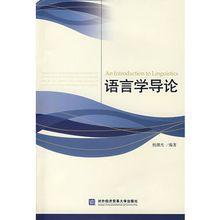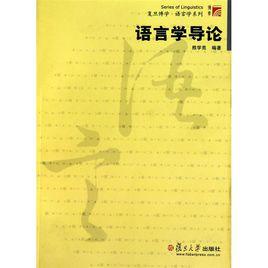百科名片
本書可以作用於大學生教材及各類學員使用。 本書採用功能派語言學的觀點編寫。本書著重從語言的社會功能出發,書中的第一部分在揭示了語言性質和功能之後,首先討論語義學的基本內容;然後討論詞法學、辭彙學及句法學;最後討論語音學和音位學。本書的第二部分揭示了語言與思維、現實,語言與文化、社會、。,意在引導學員巨觀地認識語言,深入地理解語言學的理論價值和實用價值。《語言學導論 》是一本討論語言社會功能的文獻,闡述語言與社會,文化,個人的關係,可以作用於大學生教材及各類學員使用。
 語言學導論
語言學導論內容提要
本書採用功能派語言學的觀點編寫。本書著重從語言的社會功能出發,書中的第一部分在揭示了語言性質和功能之後,首先討論語義學的基本內容;然後討論詞法學、辭彙學及句法學;最後討論語音學和音位學。本書的第二部分揭示了語言與思維、現實,語言與文化、社會、個人的密切關係,意在引導學員巨觀地認識語言,深入地理解語言學的理論價值和實用價值。本書的最後幾章探討語言與商業、語言與政治的密切關係,並討論語言學對外語“教”與“學”的啟迪,重點介紹功能派語言教學的一些觀點。本書既可作為英語專業本科高年級學生的教材,英語專業一年級碩士研究生語言學課程的參考教材,也可作為各類人員的自學用書。
編輯推薦
一、本書採用功能派語言學的觀點編寫,本書著重從語言的社會功能出發,書中的第一部分在揭示了語言的性質和功能後,首先討論語義學的基本內容,外全討論詞法學,最後討論語音學和音位學。
二、第二部分揭示了語言與思維、現實,語言與文化、社會、個人的密切聯繫。本書深入淺出,在關理論的同時,使用大量生動典型的語言實例,以期達到學術性和實用性的完美結合。三書還為各章節配有複習題和筆頭作業,並列出所推薦的參考書目。
三、本書既可做為英語專業本科高年級學生的教材,英語專業一年級碩士研究生語言學課程的參考教材,也可作為各類人員的自學用書。本書為英文版。
目錄
Part1
Chapter1LanguageandLinguistics
1.1NatureandPropertiesofHumanLanguage
1.2FunctionsofHumanLanguage
1.3Linguistics
QuestionsforReview
BooksforReference
Exercises
Chapter2Semantics
2.1TheoriesConcerningMeaning
2.2CategorizationofMeaning
2.3SenseandReference
2.4ProblemsintheStudyoftheMeaningofWords
2.5ProblemsintheStudyoftheMeaningofSentences
2.6AnalysisoftheMeaningofWordsandSentences
2.7AmbiguityinEnglish
QuestionsforReview
BooksforReference
Exercises
Chapter3MorphologyandLexicology
3.1MorphemesandMorphology
3.2MorphologicalRules
3.3DefinitionandStructureofWords
3.4Word-FormationinEnglish
3.5ChangesintheMeaningofWords
3.6OriginsofEnglishVocabulary
QuestionsforReview
BooksforReference
Exercises
Chapter4Syntax
4.1TraditionalApproach
4.2StructuralApproach
4.3Transformational-GenerativeApproach
4.4FunctionalApproach
QuestionsforReview
BooksforReference
Exercises
Chapter5PhoneticsandPhonology
5.1ProductionofSpeechSounds
5.2Phonemes,PhonesandAllophones
5.3PhonologicalRules
5.4PhoneticTranscription
5.5SuprasegmentalPhonemes
QuestionsforReview
BooksforReference
Exercises
Part2
Chapter6Language,ThoughtandReality
6.1TheoriesConcerningtheRelationshipBetween
Language,ThoughtandReality
6.2Sapir-WhorfHypotheses
6.3TheInsighttheHypothesesHaveBroughttoUs
6.4ComparisonoftheThinkingPatternsof
ChineseandEnglish-speakingPeople
6.5CriticismonLinguisticDeterminism
6.6OtherViewsConcerningtheRelationshipBetween
Language,ThoughtandReality
QuestionsforReview
BooksforReference
Exercises
Chapter7Language,Culture,SocietyandIndividuals
7.1RelationshipBetweenLanguageandCulture
7.2RelationshipofLanguagewithSocietyand
Individuals
7.3CommunicativeCompetenceinCross-Cultural
Communication
7.4HowtoAcquiretheAbilitytoCommunicate
Effectively
QuestionsforReview
BooksforReference
Exercises
Chapter8LanguageinBusinessandLanguageinPolitics
8.1LanguageinBusiness
8.2 LanguageofPoliticalOratory
QuestionsforReview
BooksforReference
Exercises
Chapter9AFunctionalApproachtoLanguage
TeachingandLearning
9.1BroadIssuesofPolicyandPracticeinLanguage
TeachingfromaFunctionalPointofView
9.2LinguisticsinLanguageTeachingandLearning
9.3FrameworkofOrganizationofTeaching
QuestionsforReview
BooksforReference
Exercises
Appendices
Appendix1TheConstituentStructureofEnglish
Semology
Appendix2TheConstituentStructureofEnglish
Grammar
Appendix3TheConstituentStructureofEnglish
Phonology
Appendix4SyllabusfortheCourse
ModelKeytoExercises
Bibliography

